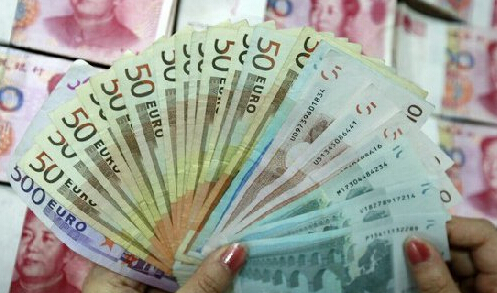anon45
SENIOR MEMBER

- Joined
- Aug 13, 2010
- Messages
- 3,212
- Reaction score
- 4
- Country
- Location
North Texas
Ah I live in LA and I was used to around $3.5 - $4 a gallon, it's gone to below 3 now.

Hell I remember when we were looking at $5 gas!
Follow along with the video below to see how to install our site as a web app on your home screen.
Note: This feature may not be available in some browsers.

North Texas


Well, thanks alot Obama! lolAh I live in LA and I was used to around $3.5 - $4 a gallon, it's gone to below 3 now.
Hell I remember when we were looking at $5 gas!

WTF?! Why is Trump not the leading candidate any more?Well, thanks alot Obama! lol






Right time to buy companies.Commodity prices are ebbing at multi-year lows and external demands are extremely weak(read:the world economy at large and western economies in particular are still in a sh1thole),no wonder China's trade surpluses are scaling higher and higher。

As the world economy seems to unable to recover, China is prudent to further promote domestic investment (Made in China 2025) and consumption (Internet of things). Lower commodity prices is a plus because China is a major manufacturing power, as @Shotgunner51 says.
It might also be the right time to acquire and invest in foreign assets, especially in machinery and high-tech.
***
Chinese cash to pour into high-tech start-ups
November 9, 2015

Bro, world oil prices are not correlated with gasoline prices, not in Canada. Gasoline is inelastic so the seller can charge whatever the hell they want, consumers will buy it.Gas prices rising? That's odd my dear, prices are dropping here in Shanghai. Where in US do you live?
Off topic: If I may ask, is there by any chance that you might bear a resemblance to your DP?

Record China trade surplus as demand sags - www.thebull.com.au
China recorded its highest trade surplus on record last month, official data shows, as plunging imports highlighted the country's continued struggle to boost domestic demand and prop up sagging growth.
The disappointing figures show how Beijing is struggling to keep the world's second-largest economy on the rails and add to mounting evidence China could be heading for a hard landing.
As the planet's biggest trader in goods and a key driver of already subdued world growth, the figures will also add to signs the global economy is facing its toughest year since the height of the financial crisis.
Imports fell 18.8 per cent compared to a year ago to $US130.77 billion ($A183 billion), the 12th consecutive monthly drop in imports, following a 20.4 per cent decrease in September, according to customs figures.
Exports, too, continued their losing streak from July, dropping by 6.9 per cent year-on-year in October to $192.41 billion as foreign demand languished.
That set the trade surplus at $US61.64 billion, a 36 per cent increase compared to the same period in 2014 and the highest such figure since at least 1995, the earliest data held on record by Bloomberg News.
The decrease in exports was larger than a median forecast of a 3.2 per cent decline in a Bloomberg News survey of economists.
The data "suggests that domestic demand remained sluggish", ANZ analysts said in a research note, adding that they expect "imports growth may start to improve gradually" into the first quarter of 2016.
Weakness in China's property market, overcapacity in the manufacturing sector and slowed government spending on infrastructure have contributed to the country's economic slowdown and decreasing demand for commodities.
Falling demand from the world's top importer of everything from industrial metals and energy to corn has in turn driven commodity prices down, which has made China's exports even cheaper.
Coal imports have dropped almost 30 per cent in volume and 45 per cent in value over the first 10 months of the year, measured in the local currency, the data showed.
The sagging numbers have caused anxiety for countries like Australia and Mongolia, whose economies are driven by Chinese demand for the raw materials they produce, despite government efforts to stimulate the economy.
Last week, the ruling Communist Party announced its intention to pursue a combination of stimulus and structural reform measures in its 13th five-year plan, which provides guidance for the national economy through 2020.

Tomorrow is critical.Erm, correct me if I am wrong. Isn't domestic demand in China better reflected by indicators such overall domestic consumption (including 居民消费支出, 最终消费支出 and 政府消费支出 in China's case) rather than indicators such as import?
Take the recent development in Chinese domestic chip industry for example, increased output and quality of domestic chips will lead to a drop in importation for computer chips, but that doesn't mean domestic consumption have dropped. In fact, it will just be opposite where lower cost and easier intellectual property coordination likely to lead to an increase in consumption.

I think the Republican polls are rigged by undercover democrats... Hehehe.WTF?! Why is Trump not the leading candidate any more?

Maybe Trump himself is a undercover democrat.I think the Republican polls are rigged by undercover democrats... Hehehe.

Maybe Trump himself is a undercover democrat.

It doesn't really matter, they are only puppets.Trump's personality is the type of the in your face personality, it is good for making a TV show, but I am not sure I like that for the leader of a nation.
To be honest though, I have been listening to all these candidates talk and I received really little information on their actual ability to govern.
